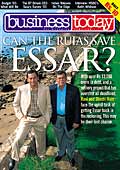 Can
the Ruias Save Essar? (February 16) Can
the Ruias Save Essar? (February 16)
A year ago, such a question would
have invited (and in fact did elicit) plenty of incredulous guffaws.
After all, here was a business group that wasn't only down, but
a few thousand feet deep under the ground. Almost everything that
could have gone wrong did go wrong with the Ruias' grand ambitions
for Essar. Their steel plant couldn't have come on stream at a worse
time-when steel prices had been hammered to an all-time low. Their
grandiose refinery project got stuck because nobody was willing
to lend. And what wasn't helping at all was the group's perception
as a siphoner of funds that were raised from the public.
Rather than fade away, the Ruias have chosen to fight it out.
Aiding them in that comeback bid are steel prices, which are finding
new highs every month, and which promise to smartly change the fortunes
of the once deep-in-the-red Essar Steel. What's more, after five
years the refinery is finally looking a reality with institutions
willing not just to lend, but to restructure the Ruias' debt. And
their detractors too seem to be silenced. At least for the moment.
 Can
the Sensex Touch 4000? (March 30) Can
the Sensex Touch 4000? (March 30)
Another question, another one that
had many (including at times the writer of that story himself) wondering
how this gargantuan target for the stockmarket index could ever
be achieved in this lifetime. Remember this was the time when the
Sensex was having problems kissing the 3,000-mark and the Gulf War
was threatening to dampen whatever little bullish sentiment existed
at that time. The market experts BT spoke to did predict better
times towards the year-end, but the most bullish prediction for
the Sensex by year-end was 3700. Today, the Sensex is within striking
distance of 6000. Moral of the story: Don't even attempt to predict
markets. Just put your mouth where the money is!
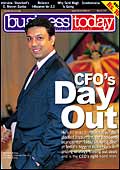 CFO's
Day Out (May 25) CFO's
Day Out (May 25)
Last year must go down as the year
of the CFO. Why? Because he made it to the cover of BT, another
business magazine coincidentally realised the CFO had suddenly come
of age, and CFO awards, seminars, and television discussions were
all over the place. On the cover of CFO's Day Out was Sumant Sinha,
the 36-year-old former New York-based debt capital markets specialist
from ING Barings, who's also the son of External Affairs Minister
Yashwant Sinha. Now the A.V. Birla Group's pr machinery insists
on telling journalists that Sinha isn't the CFO of the A.V. Birla
Group, and that D.D. Rathi should enjoy that distinction. Perhaps,
but Sinha is surely the brightest, and most exciting face in corporate
finance today. Watch out for him. Other CFOs to keep track of include
Ravi Ramu of Mphasis, Deepak Ghaisas of i-flex, and N.S. Kannan
of ICICI Bank.
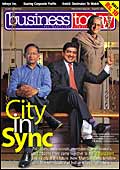 City
In Sync (August 17) City
In Sync (August 17)
The big story wasn't that Bangalore,
a city of six million that's emerged the hub of knowledge businesses
in India, is changing, but how it is changing. How government (Karnataka
cm S.M. Krishna), business (Nandan Nilekani, CEO, Infosys, and also
Chairman of the Bangalore Agenda Task Force) and administration
(Bangalore Development Authority-its chief, Jayakar Jerome shared
the cover with Nilekani and Krishna-and other administrative agencies
like the city corporation and the police department) are forging
a partnership to create India's city of the future.
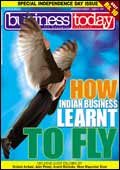 How
Indian Business Learnt To Fly (August
31) How
Indian Business Learnt To Fly (August
31)
It was a Special Issue in more ways
than one. It attempted to track the various freedoms India, its
business world, and its consumers have got over the years. Whilst
it may be a long time since 1947, few would disagree that the real
freedom (from limited means, and of choice) came post-1991, when
liberalisation was ushered in, and economic reforms dismantled many
of the chains that had fettered Indian business for so long. Better
late than never, we're sure you'd agree.
P.S: The I-Day Special also gave BT the opportunity to create
a unique product of its own: The BT Freedom Index. Check it out
if you haven't yet and still can.
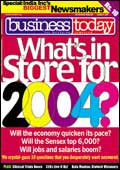 What's
In Store For 2004 (January 4) What's
In Store For 2004 (January 4)
Our previous issue was a blockbuster
because it provided answers to questions that matter to most of
us. What's more, we were ready with those answers first, perhaps
when many of our esteemed rivals were busy shaping the questions.
Would the Sensex touch 6000 (okay, that's an easy one; perhaps will
is the wrong word, when would be more apt), will GDP grow by 7.5
per cent, will disinvestment reforms resume, will the BPO backlash
worsen, will interest rates firm up, will salaries boom? Hmm...some
of those questions aren't easy ones, but that's exactly why BT is
around, right?
|
